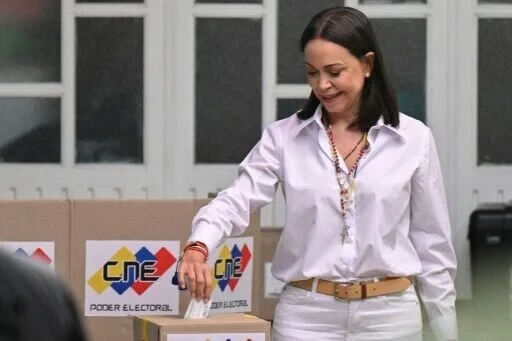Maduro's poll win sparks outcry from Venezuela's opposition

Stay tuned with 24 News HD Android App

An air of dejection hung over parts of Caracas on Monday as voters and the international community questioned the presidential election victory awarded to Venezuelan strongman Nicolas Maduro with the opposition crying foul.
After a turbulent decade in power, incumbent Maduro, 61, was declared the winner of elections held amid widespread fears of fraud and a campaign tainted by accusations of political intimidation.
Pollsters had predicted a resounding victory for the opposition despite institutions loyal to the regime blocking its popular leader Maria Corina Machado from running.
The CNE electoral council, largely loyal to Maduro, declared he had won re-election with 51.2 percent of votes, with 44.2 percent for Machado's proxy, Edmundo Gonzalez Urrutia.
The opposition rejected the result, saying it had taken at least two-thirds of the vote.
"They stole the election," voter Angelika Daron, 46, told AFP, crying the morning after the vote. She had worked as an election monitor for the opposition.
"We are sad, but we also know that our leader is going to do everything possible to prove that there was fraud," she said.
Car guard Giovanni Inglese, 65, said he was convinced the outcome had been "manipulated."
"Depressed. Disappointed. Humiliated," he told AFP of his state of mind, his shoulders slumped. "Humiliated... because the crook is the one who wins in this country."
But Inglese said people were unlikely to protest en masse. He, for one, will not.
"People are scared" having learned through experience that "the one who goes out there pays with his life."
In some neighborhoods of the capital, residents were heard banging pots and pans in protest.
The result sparked concern over irregularities from the United States, European Union and several countries in Latin America.
'Another fraud'
Gonzalez Urrutia, a 74-year-old former diplomat, vowed late Sunday that "we will not rest until the will of the Venezuelan people is reflected."
Machado, for her part, said the election was "another fraud," and despite the official result: "Venezuela has a new president-elect and it is Edmundo Gonzalez Urrutia."
Venezuela expert Rebecca Hanson, of the University of Florida's Center for Latin American Studies, told AFP the outcome was not ideal for Maduro either.
"In terms of gaining some international legitimacy, which I think was a goal for Maduro, these elections were a disaster for him given the blatant manipulation," she said.
Nine Latin American countries -- Argentina, Costa Rica, the Dominican Republic, Ecuador, Guatemala, Panama, Paraguay, Peru and Uruguay -- called in a joint statement Monday for a "complete review of the results with the presence of independent electoral observers."
Several observers had been turned away at the last minute.
Brazil's foreign ministry called for an "impartial verification" of the results while Colombia urged an "independent audit."
Chile's president said the outcome was "hard to believe" and Peru recalled its ambassador.
US Secretary of State Antony Blinken expressed "serious concerns" and European Union foreign policy chief Josep Borrell called for "full transparency."
Maduro received congratulations from allies China, Russia, Cuba, Nicaragua, Honduras and Bolivia.
'Bloodbath' warning
Independent polls had predicted Sunday's vote would end 25 years of "Chavismo," the populist movement founded by Maduro's socialist predecessor and mentor, the late Hugo Chavez.
Since 2013, Maduro has been at the helm of the once-wealthy petro-state, where GDP dropped by 80 percent in a decade, pushing more than seven million of its 30 million citizens to emigrate.
He is accused of locking up critics and harassing the opposition in a climate of rising authoritarianism.
In the run-up to the election, he warned of a "bloodbath" if he lost.
Ballots were cast on machines that sent electronic votes directly to a centralized CNE database.
The machines print out paper receipts, placed in a container and counted by hand, as a backup meant to be open to public scrutiny.
The opposition had deployed about 90,000 volunteer election monitors to polling stations nationwide.
Economic misery
Sunday's election was the product of a mediated deal reached last year between the government and opposition.
That agreement led the United States to temporarily ease sanctions imposed after Maduro's 2018 re-election, rejected as a sham by dozens of Western and Latin American countries.
Sanctions were snapped back after Maduro reneged on agreed conditions.
Washington seeks a return to stability in Venezuela, which boasts the world's largest oil reserves but severely diminished production capacity.
Economic misery in the South American nation has been a major source of migration pressure on the US southern border.
Most Venezuelans live on just a few dollars a month, and endure biting shortages of electricity and fuel.
The government blames sanctions, but observers also point the finger at corruption and government inefficiency.
